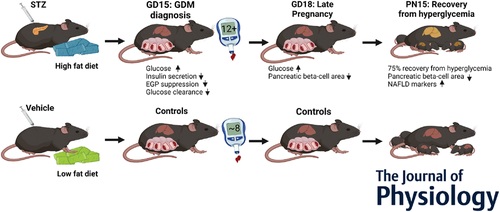
New Key Publication: Hyperglycemia, pregnancy outcomes and maternal metabolic disease risk during pregnancy and lactation in a lean gestational diabetes mouse model

Abstract
Hyperglycemia in pregnancy (HIP) is a pregnancy complication characterized by mild to moderate hyperglycemia that negatively impacts short- and long-term health of mother and child. However, relationships between severity and timing of pregnancy hyperglycemia and postpartum outcomes have not been systemically investigated. We investigated the impact of hyperglycemia developing during pregnancy (gestational diabetes mellitus, GDM) or already present pre-mating (pre-gestational diabetes mellitus, PDM) on maternal health and pregnancy outcomes. GDM and PDM were induced in C57BL/6NTac mice by combined 60% high fat diet (HF) and low dose streptozotocin (STZ). Animals were screened for PDM prior to mating, all underwent an OGTT on gestational day (GD)15. Tissues were collected at GD18 or at postnatal day (PN)15. Among HFSTZ-treated dams, 34% developed PDM and 66% developed GDM, characterized by impaired glucose-induced insulin release and inadequate suppression of endogenous glucose production. No increased adiposity or overt insulin resistance was observed. Furthermore, markers of non-alcoholic fatty liver disease (NAFLD) were significantly increased in PDM at GD18 and were positively correlated with basal glucose levels at GD18 in GDM dams. By PN15, NAFLD markers were also increased in GDM dams. Only PDM affected pregnancy outcomes such as litter size. Our findings indicate that GDM and PDM, resulting in disturbances of maternal glucose homeostasis, increase the risk of postpartum NAFLD development, related to the onset and severity of pregnancy hyperglycemia. These findings signal a need for earlier monitoring of maternal glycemia and more rigorous follow-up of maternal health after GDM and PDM pregnancy in humans. KEY POINTS: We studied the impact of high-fat diet/streptozotocin induced hyperglycemia in pregnancy (HIP) in mice and found that this impaired glucose tolerance and insulin release. Litter size and embryo survival were compromised by pre-gestational, but not by gestational diabetes. Despite postpartum recovery from hyperglycemia in a majority of dams, liver disease markers were further elevated by PN15. Maternal liver disease markers were associated with the severity of hyperglycemia at GD18. The association between hyperglycemic exposure and NAFLD signal a need for more rigorous monitoring and follow-up of maternal glycemia and health in diabetic pregnancy in humans. Abstract figure legend Streptozotocin and high fat diet were used to induce GDM in female BL6/NTac mice. Pregnant dams underwent an OGTT at GD15 to confirm GDM diagnosis. By GD18, dams were hyperglycemic and showed a reduction in pancreatic beta cells. By PN15, dams additionally had developed an increase in NAFLD markers, despite the majority of the dams having recovered from hyperglycemia
The Journal of Physiology: https://physoc.onlinelibrary.wiley.com/doi/10.1113/JP284061
Authors:
- Angela J C Tol
- Kaja Hribar
- Janine Kruit
- Laura Bongiovanni
- Marcel A Vieira-Lara
- Mirjam H Koster
- Niels J Kloosterhuis
- Rick Havinga
- Martijn Koehorst
- Alain de Bruin
- Barbara M Bakker
- Maaike H Oosterveer
- Eline M van der Beek
More news
-
15 September 2025
Successful visit to the UG by Rector of Institut Teknologi Bandung
